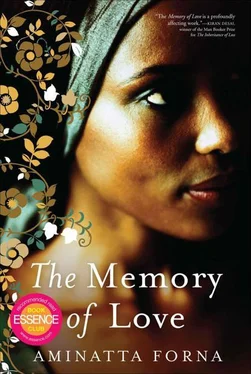‘I heard something about this man,’ he says presently, ‘the one you say was hit by a bicycle. I heard a stranger was hurt.’
‘Who told you that?’
Ishmail shrugs. ‘People talk.’ He is sitting hunched over the table, facing Kai, one arm curled around his beer. He speaks in a low voice. ‘Some bad business.’
‘He was attacked,’ says Kai. He tells Ishmail all he knows about Agnes, Adrian’s imprudent visit to her house. The son-in-law.
Ishmail nods as if somehow it all makes sense to him.
‘Do you know what it was about?’ asks Kai.
Ishmail shakes his head. ‘There are some bad people here. You were not here during the fighting, you didn’t see. I was not here much of the time, but I was here before. I came back after and saw how things were different. Now they say it’s over, but it is not over. You see those men we passed?’
‘Who?’ Kai looks at the men at the bar.
‘No, not these ones. Them that we passed in that house. They arrived at that time and they are still here. People want them to go, but they don’t go. The government told the fighters to return to their own homes, but many stayed.’
‘Why?’
‘Maybe because they found a better life. Maybe because they have nowhere else to go.’ Ishmail shakes his head, positions his beer bottle on the damp cardboard mat, turns the label carefully round to face him and studies it. ‘So they stay. Why not?’
‘Was it one of them who attacked my friend?’
This time Ishmail shakes his head emphatically. ‘No, I don’t think so.’ He takes a drink of his beer. On the television a player misses a penalty. One of the men slams his bottle down on the table and exclaims. Ishmail picks at the label on his beer bottle and says no more. Kai decides to confide in Ishmail about his plans to go to America. His cousin grins and congratulates him, raises his beer bottle. They both drink.
‘When you get there send something small for me.’
They finish drinking and Ishmail stands. ‘Let’s go,’ he says. Outside they collect Abass, who has collected some grass and leaves and laid them in front of the goat, though his offerings have gone untouched.
‘Maybe she’s thirsty,’ suggests Kai. As Abass goes to ask the kitchen for a bowl of water, Ishmail says, ‘This is a good friend of yours, this man who was beaten?’
‘Yes,’ answers Kai. ‘A good friend. Though he’s a visitor here, we have become close through the hospital. I stay at his place often. He wants to help.’
Ishmail nods. ‘We should all have friends. Look at Abass. He can create friends across the species.’
The goat is down on her front knees drinking from the bowl. Abass stands by happily, arms dangling at his sides. They walk out into the darkening streets, back the way they came, until at one point Ishmail turns away from their route saying, ‘Let us use this road. Perhaps I know somebody you can talk to.’ Kai follows, saying nothing. Presently they reach a house. A curtain hangs in front of the open door, glimmers of light behind. Ishmail knocks on the door frame, pushing the curtain gently aside. Kai waits. He hears Ishmail speaking to somebody. He is beckoned inside. A woman is sitting on a stool shelling groundnuts. She wipes her hands on her dress.
‘I have told her what it is you want to know,’ says Ishmail. ‘She is my wife’s aunt. She agrees to help you.’
The woman offers him the back of her wrist. Kai touches it with the back of his own.
‘Agnes was not always this way,’ she says. ‘Before she was like you and me. And then she became crossed.’ She removes the stool from beneath her, brushes the seat and sets it down. ‘Please.’
Kai sits.
She offers him some of the groundnuts and leaves the room with Ishmail. Kai prepares to wait.
How many hours he sat there he would not later recall. At some point the boy, sleepy and tired of waiting outside, crept in to be with him and Kai allowed him to stay, sheltered beneath the wing of his arm. People were sent for. A neighbour. A young woman without a smile. An older woman with a creased face and white hair. Kai waited and listened without interrupting or speaking except to greet each new arrival, watch while they took a seat and were told what was required of them. He didn’t speak even when they faltered; he offered no solace but left it to others. Each person told a part of the same story. And in telling another’s story, they told their own. Kai took what they had given him and placed it together with what he already knew and those things Adrian had told him.
This was Agnes’s story, the story of Agnes and Naasu. In hushed voices, told behind a curtain in a quiet room and in the eye of the night, from the lips of many. By the time the last speaker had finished the moon was well past its zenith and Kai understood the storytellers’ courage.
Mohammed remembered Naasu. How every Monday she walked the same route to the bus stop wearing a pair of high-heeled shoes and a suit made of shiny fabric. Every Friday the bus carried her back, and this time she wore a simple cotton dress. On Monday when she walked to the bus stop, Mohammed and the other young motorbike-taxi riders would watch her pass from their place by the roundabout. Mohammed would sometimes offer her a lift and sometimes, too, she accepted. She would sit with her legs to one side and be carried down to the bus stop. A lot of young men had an idea they might put cola for Naasu, who was one of the finest girls in the town and from a good family. You could see it in the way she held herself. She had the job in the city department store. Some of the young men teased her. When are you coming to take me to the big city with you, Naasu? And she smiled and teased them back. She was bold, but in such a way as you understood there was nothing in it. For they had all known each other for a long time, they were her classmates. Everybody knew Naasu. Sometimes she stopped by her father at the nursery with fried doughnuts for his sweet tooth. They would sit on the frame of an old tractor. If Naasu was sitting with her father outside the nursery that meant it was a Friday, the day she returned from the city. During the curfew months she used to arrive home a little earlier, when the buses became cautious about travelling the roads at night. Naasu’s father and she ate sugared doughnuts sitting on the rusting frame of the old John Deere tractor the last Friday Naasu was home.
Naasu was away in the city the day the thin men came to the town.
This is what Mohammed remembers about Naasu.
On market day, at six o’clock in the morning, Binta rose and dressed, washing from the bucket in the corner of the yard. By six-thirty she was ready to walk the half-mile to the town with her small basket of cucumbers and tomatoes. This was the part of the day she liked the best, the moments of quiet on the walk to the town past the sugar-cane fields. Within the hour the sun would be strong enough to dry the dew, drawing spirals of mist from the earth. As Binta passed the avenues of sugar cane she saw shadows moving between the rows. Somebody’s goats must have broken free.
On the outskirts of the town she passed Agnes working in her vegetable garden. They called to one another. ‘ Ng’ dirai? ’ Agnes’s husband was there in the background; the rising sun lent a dark edge to the shape of his body. He was too far away for Binta to greet him, so she walked swiftly on, hoping to beat Agnes, whose tomatoes were always so plump and shiny, to the first of the customers.
By eight o’clock Binta had set up her stall and the first buyers had already appeared. Agnes was there, two stalls away from Binta. A customer dropped a tomato and Binta bent to retrieve it, annoyed to see it had bruised and the skin was split. While she had her head below the level of the stall, she heard the sound of gunfire. She had heard it before, only never so close. All around her people started at the sound and began to move, some in one direction and some in another, like a herd of sheep on a road, uncertain in which direction safety lay. In the end they stood still.
Читать дальше












